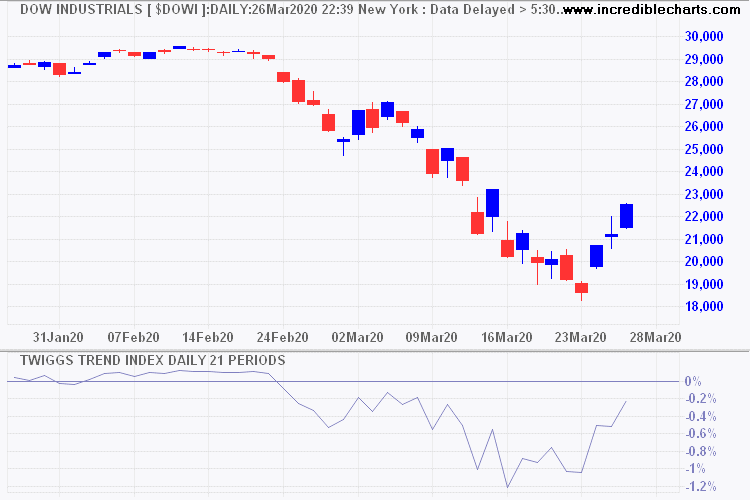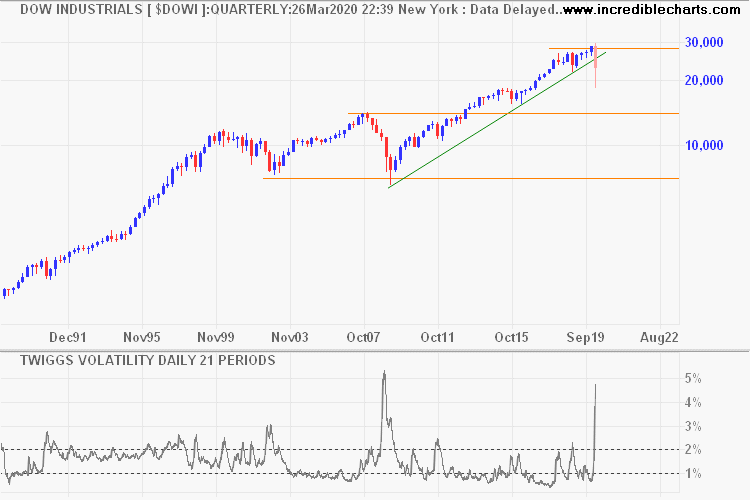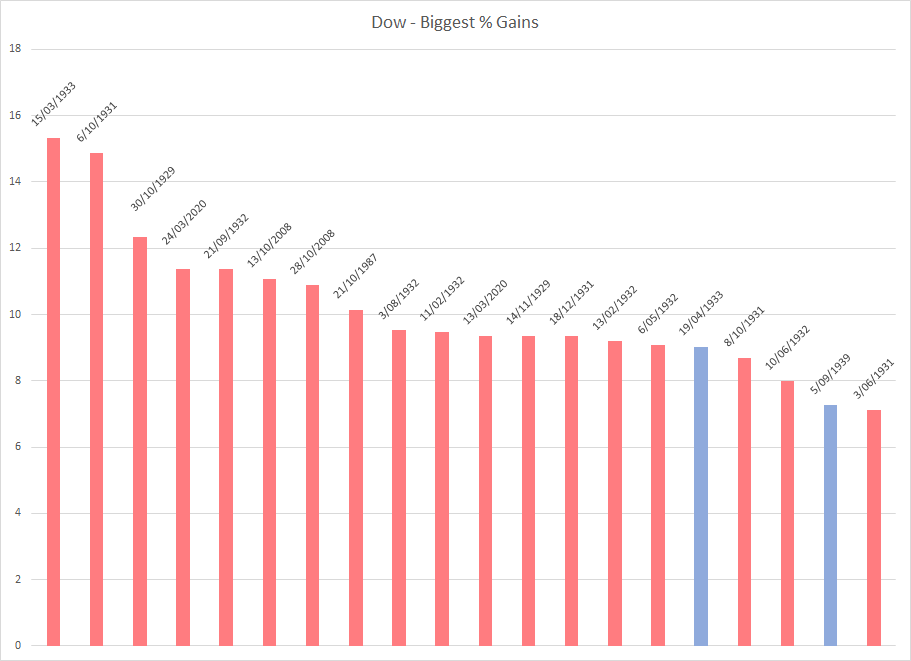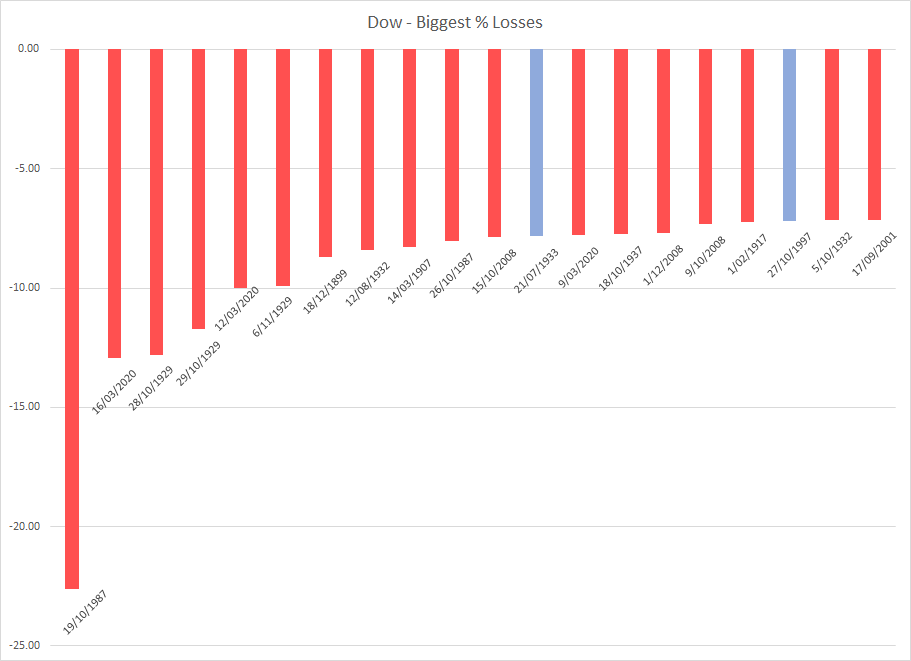Chart of the Week: Not so Fast WSJ
By Colin Twiggs
March 28, 2020 4:00 a.m. EDT (7:00 p.m. AEDT)
First, please read the Disclaimer.
We were surprised to receive this from The Wall Street Journal on Friday:
Markets Alert
Dow Industrials Rally, Ending Bear MarketA new bull market has begun. The Dow Jones Industrial Average has rallied more than 20% since hitting a low three days ago, ending the shortest bear market ever.

That is news to us. A 20% reversal is a quick rule of thumb used by brokers. It is not part of Dow Theory. To suggest that we are now in a bull market is ludicrous.
Dow Theory tracks secondary movements in the index which last from ten to sixty days (Nelson, 1903). Only if the secondary movement forms a higher trough followed by a higher peak does that signal reversal to an up-trend. And the same pattern has to occur on the Transport Average to confirm the change.
A three-day rally is a normal part of a bear market and, with volatility near record highs, it is likely that some rallies are going to reach 20 per cent.

Bear markets are more volatile than bull markets. You can see this from the volatility spikes above in 1991, 2000-2003, 2008, and 2020. Stocks go up on the escalator and down in the elevator.
According to data from S&P Dow Jones Indices, most days with the biggest gains occur in a bear market. Eighteen of the top twenty biggest daily % gains on the Dow occurred in a bear market. Only two (marked in blue) were in a bull market.

The largest gains in the 1930s bear market were as high as 15% in a single day!
Interesting that eighteen of the top twenty biggest daily % losses on the Dow also occurred in a bear market (red).

That is because volatility is a lot higher in bear markets than in bull markets.
So expect big moves in both directions.
It is time to recognize that financial markets are inherently unstable. Imposing market discipline means imposing instability, and how much instability can society take? .... To put it bluntly, the choice confronting us is whether we will regulate global financial markets internationally or leave it to each individual state to protect its interests as best it can. The latter course will surely lead to the breakdown of the gigantic circulatory system, which goes under the name of global capitalism.
~ George Soros: The Crisis of Global Capitalism (1998)
Updates for Market Analysis Subscribers
Please take advantage of our $1 special offer for the first month. Cancel at any time.
- S&P 500: Markets face two types of contagion
- ASX braces as China shock looms
- Australia, Gold & US Treasuries
- Gold versus cash
- Dow: Not so fast WSJ
- Australia: "It'll all be over by Christmas"
- Gold: Another pullback
Disclaimer
Colin Twiggs is director of The Patient Investor Pty Ltd, an Authorised Representative (no. 1256439) of MoneySherpa Pty Limited which holds Australian Financial Services Licence No. 451289.
Everything contained in this web site, related newsletters, training videos and training courses (collectively referred to as the "Material") has been written for the purpose of teaching analysis, trading and investment techniques. The Material neither purports to be, nor is it intended to be, advice to trade or to invest in any financial instrument, or class of financial instruments, or to use any particular methods of trading or investing.
Advice in the Material is provided for the general information of readers and viewers (collectively referred to as "Readers") and does not have regard to any particular person's investment objectives, financial situation or needs. Accordingly, no Reader should act on the basis of any information in the Material without properly considering its applicability to their financial circumstances. If not properly qualified to do this for themselves, Readers should seek professional advice.
Investing and trading involves risk of loss. Past results are not necessarily indicative of future results.
The decision to invest or trade is for the Reader alone. We expressly disclaim all and any liability to any person, with respect of anything, and of the consequences of anything, done or omitted to be done by any such person in reliance upon the whole or any part of the Material.
Please read the Financial Services Guide.

Author: Colin Twiggs is a former investment banker with almost 40 years of experience in financial markets. He co-founded Incredible Charts and writes the popular Trading Diary and Patient Investor newsletters.
Using a top-down approach, Colin identifies key macro trends in the global economy before evaluating selected opportunities using a combination of fundamental and technical analysis.
Focusing on interest rates and financial market liquidity as primary drivers of the economic cycle, he warned of the 2008/2009 and 2020 bear markets well ahead of actual events.
He founded PVT Capital (AFSL No. 546090) in May 2023, which offers investment strategy and advice to wholesale clients.
